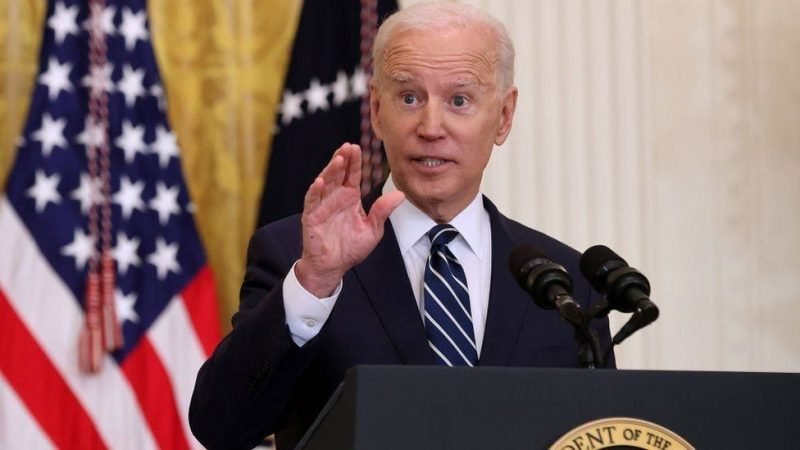Biden administration is facing “Either Democracy and Human Rights or National Interests”

The US President Joe Biden has explicitly declared, in Munich security conference, the worldwide democratization as an indispensable objective of his foreign policy. Fulfilment of national interest is undoubtedly an inherent part of all foreign policies. But the US administration is finding many times both the objectives mutually contradictory. Decisions on the issue of Afghanistan’s peace through power-sharing with the Afghan Taliban, Jamal Khashoggi’s murder, the Myanmar coup and Alexey Navalny’s poisoning have manifested this dilemma.
Biden administration has emphasized restarting negotiations with the Afghan Taliban for ensuring long-lasting peace and complete withdrawal of the US troops from Afghanistan. For this, Antony Blinken’s letter to Afghan President Ashraf Ghani has insisted to work with regional powers including India, which share the common national interests in stable and peaceful Afghanistan.
US administration has proposed the urgent power-sharing of the Afghan Government with the Afghan Taliban, which has been intimidating entire humanity and particularly Afghan peoples, in order to prevent “Taliban’s spring offensive” in security vacuum generated due to withdrawal of US forces. But the United States has ignored that such power-sharing is nothing but the rewards for the Taliban’s terrorist activities. And if power-sharing was carried out, the Afghan Taliban would be able to use even the Afghan army as per its personal interests by freezing all the counter-terrorism operations. Thus ultimately, it were furthering the self-sustaining terroristrocracy instead of democracy. In fact, the Biden administration has indirectly embraced the compromise with democracy in order to ensure the fulfilment of the US interest- the complete withdrawal of US troops merely.

The release of declassified US intelligence report, in. which it has been concluded that Prince Mohammad Bin Salman had ordered the killing of Jamaal Khashoggi at the Saudi consulate located in Istanbul in response to harsh criticism of Prince Salman’s policies by Khashoggi, has fuelled the demand of strong action against Prince Salman for his intolerant and inhuman action. But President Biden, by venturing in contrary to his campaign pledge for making a pariah of Prince Salman, has decided to enhance the strategic relationships with Saudi Arabia, which is the US arms importer, very influential oil exporter as well as a counterbalance to Iran in the Middle East. Although the US treasury department has imposed sanctions over former Saudi intelligence chief Ahmad-Al-Asiri and Saudi royal guard’s Rapid Intervention Force; and Ned Price has termed it as a recalibration instead of rupture, yet it has clearly reflected the repudiation of human rights, a longstanding indispensable part of the US foreign policy, for the sake of resurrection and further enhancement of US-Saudi Arabia relations after the cessation to the US support for the military campaign in Yemen.
In fact, reluctance for action against prince Salman, who is about to be ruler for more than a decade, for ensuring better future relations manifests another possibility of promotion of bilateral relations in the cost of human rights. It further reflects president Biden’s priority for strategic national interests over democratic consolidation in the Saudi Kingdom, where imprisonment and torture of writers, businessmen, women right activists and clerics etc are very common.
Moreover, when despite intensifying international pressure, the military has increased the killing of pro-democracy and anti-coup protestors in Myanmar, US Commerce Department has imposed sanctions over Myanmar’s ministries of Home and defence affairs and two military-related corporations- Myanmar Economic Corporation and Myanmar Economic Holding Limited on March 4. Moreover, the US state department’s spokesperson Ned Price has appealed to the regime to exert “maximum restraint” against the military coup. But his call for China, which has already blocked the United Nations Security Council from issuing an order condemning the coup, to use its influence for restoring Myanmar’s civilian government has raised the question of the relevance of this decision. But undoubtedly, the decision of sanction has been a reply to critics of the Biden administration on the Khashoggi’s issue.

The Biden administration has accompanied the European Union by imposing sanctions on seven mid-level senior officials along with more than a dozen government entities over nerve agent attack on Alexei Navalny, the main opponent of Russian President Putin, on the ground of deep human rights violations. But it has excluded many other powerful businessmen, bankers and oligarch, over whom Navalny wanted western sanctions. The US has further imposed sanctions as per the Chemical and Biological weapons control and warfare eliminations act over Russian entities which have allegedly worked for developing and testing chemical weapons. Russia has condemned this step as the US intervention in its internal affairs.
Biden administration’s this step, on the one hand, bring USA closer to the EU, which has been continuously demanding strong action against Russia for the undemocratic and illegal annexation of Crimea autonomous region of Ukraine in 2014. But on the other hand, it has also created a positive environment for strengthening NATO, which is also an indispensable part of the US foreign policy as President Biden has announced in the Munich security conference. It will provide the USA military superiority against Russia’s very strong military preparedness in Antarctica. The imposition of sanctions over Russian entities also weakens it indirectly. There is a high propensity for war for natural resources of the uninhabited continent in future.
Thus, the Biden administration has embraced human right and democracy where it is either promoting or not exerting adverse impact on national interests. Issues of Myanmar and Russia have diverted the attention of all the critics of the US administration for its repudiation of human rights and rejection of making a pariah of Prince Salman for the barbaric killing of Jamal Khashoggi.


















